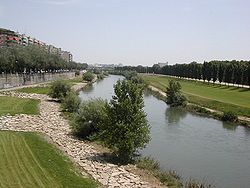This article needs additional citations for verification. (October 2008) |
| Segre | |
|---|---|
 The Segre in Lleida | |
 Path of the Segre [1] | |
| Location | |
| Countries | |
| Physical characteristics | |
| Source | |
| • location | Pyrenees |
| • coordinates | 42°24′8″N 2°6′31″E / 42.40222°N 2.10861°E |
| • elevation | 2,400 m (7,900 ft) |
| Mouth | |
• location | Ebro |
• coordinates | 41°21′42″N 0°18′15″E / 41.36167°N 0.30417°E |
| Length | 265 km (165 mi) |
| Basin features | |
| Progression | Ebro→ Balearic Sea |
The Segre (Catalan pronunciation: [ˈsɛɣɾə] or [ˈseɣɾe]; French: Sègre) is a river tributary to the Ebro (Ebre in Catalan) with a basin comprising territories across three states: France, Andorra, and Spain.

The river Segre, known to Romans and Greeks as Sicoris, and to the Arabs of Al-Andalus as Nahr az-Zaytūn (نهر الزيتون, river of Olives) [1] has its sources on the north face of the Pic del Segre or Puigmal de Segre ("Segre's Peak") in the French department Pyrénées-Orientales (historically the comarca of Alta Cerdanya), in the Catalan Pyrenees.[2] It follows a western direction all along the Cerdanya (Cerdagne) Valley, and crosses the town Saillagouse, the Spanish exclave Llívia, and Bourg-Madame.
It enters Spain at Puigcerdà and continues west until La Seu d'Urgell, where it meets the Valira River coming from Andorra. From this point, it adopts a south-western course across the pre-Pyrenees (with several dams along its gorges) and the western plains of Catalonia. It passes through Balaguer, Lleida, and flows into the Ebro at Mequinenza.
Among its tributaries: Valira (from Andorra), Noguera Pallaresa, Noguera Ribagorzana, and Cinca.
- ^ Nuzhatul Mushtaq (Arabic)[permanent dead link]
- ^ "Géoportail". Archived from the original on 2010-12-15. Retrieved 2008-10-05.